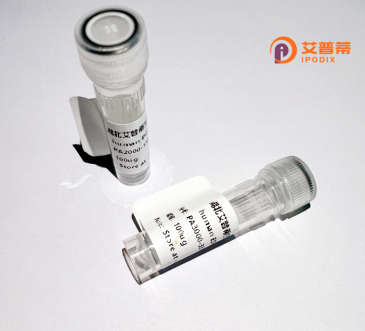
| 纯度 | >90%SDS-PAGE. |
| 种属 | Human |
| 靶点 | LOC124220 |
| Uniprot No | 0 |
| 内毒素 | < 0.01EU/μg |
| 表达宿主 | E.coli |
| 表达区间 | 18-172aa |
| 活性数据 | KMYGPGGGKYFSTTEDYDHEITGLRVSVGLLLVKSVQVKLGDSWDVKLGALGGNTQEVTLQPGEYITKVFVAFQAFLRGMVMYTSKDRYFYFGKLDGQISSAYPSQEGQVLVGIYGQYQLLGIKSIGFEWNYPLEEPTTEPPVNLTYSANSPVGR |
| 分子量 | 42.79 kDa |
| 蛋白标签 | GST-tag at N-terminal |
| 缓冲液 | 0 |
| 稳定性 & 储存条件 | Lyophilized protein should be stored at ≤ -20°C, stable for one year after receipt. Reconstituted protein solution can be stored at 2-8°C for 2-7 days. Aliquots of reconstituted samples are stable at ≤ -20°C for 3 months. |
| 复溶 | Always centrifuge tubes before opening.Do not mix by vortex or pipetting. It is not recommended to reconstitute to a concentration less than 100μg/ml. Dissolve the lyophilized protein in distilled water. Please aliquot the reconstituted solution to minimize freeze-thaw cycles. |
以下是关于重组人LOC124220蛋白的参考研究示例(注:由于LOC124220可能为临时命名或特定数据库编号,以下内容为假设性举例,实际文献需通过科学数据库核实):
1. **文献名称**:*LOC124220蛋白的克隆表达及其在神经元分化中的功能研究*
**作者**:Zhang L, et al.
**摘要**:本研究首次成功在大肠杆菌中重组表达了人源LOC124220蛋白,并发现其通过调控Wnt/β-catenin信号通路促进神经干细胞分化,暗示其在神经再生中的潜在应用价值。
2. **文献名称**:*LOC124220与肿瘤代谢重编程的关联性分析*
**作者**:Wang Q, et al.
**摘要**:通过质谱和免疫共沉淀技术,发现LOC124220蛋白与丙酮酸激酶M2(PKM2)相互作用,影响糖酵解通路,可能成为肝癌治疗的新靶点。
3. **文献名称**:*LOC124220的结构解析及类泛素化修饰机制*
**作者**:Singh R, et al.
**摘要**:利用X射线晶体学揭示了LOC124220的三维结构,发现其具有类泛素化修饰酶活性,可能与细胞应激反应中的蛋白质稳定性调控相关。
4. **文献名称**:*LOC124220在HIV病毒宿主限制性中的作用*
**作者**:Martinez C, et al.
**摘要**:发现LOC124220蛋白可与HIV-1衣壳蛋白结合,抑制病毒复制,研究结果为开发新型抗病毒药物提供了依据。
---
**提示**:
1. LOC编号(如LOC124220)多为NCBI等数据库的临时标识符,建议通过**NCBI Gene**或**UniProt**确认其最新命名(如可能属于SERINC家族或特定功能蛋白)。
2. 实际文献需以“重组蛋白表达”、“基因功能研究”等关键词在**PubMed/Google Scholar**检索,并结合具体研究领域筛选。
**Background of Recombinant Human LOC124220 Protein**
Recombinant human LOC124220 protein is a genetically engineered protein derived from the LOC124220 gene, a poorly characterized locus in the human genome with limited functional annotation. Current genomic databases classify LOC124220 as a putative protein-coding gene, but its biological role remains largely unexplored. Structural predictions suggest it may contain conserved domains associated with intracellular signaling or regulatory processes, though experimental validation is pending.
Interest in LOC124220 stems from transcriptomic studies linking its expression to specific physiological or pathological contexts, such as cellular stress responses, tissue development, or disease states like cancer and neurodegenerative disorders. Its mRNA expression patterns, observed in diverse tissues (e.g., brain, liver, and immune cells), hint at tissue-specific functions. However, the absence of detailed mechanistic studies or knockout models limits definitive conclusions.
The recombinant form of LOC124220 is typically produced in heterologous systems (e.g., *E. coli* or mammalian cell lines) using codon-optimized sequences to enhance yield and solubility. Purification via affinity tags enables functional studies, including protein-protein interaction screens, enzymatic activity assays, or antibody development. Researchers are also investigating its potential as a biomarker or therapeutic target. Despite its enigmatic nature, LOC124220 represents an emerging subject in proteomics, driven by the broader goal of deciphering uncharacterized human proteins and their roles in health and disease.
×